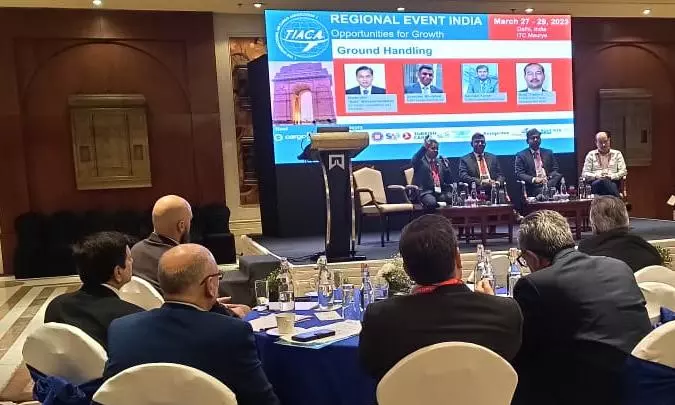"Indian air cargo wants to lead and be the model that inspires": TIACA

Glyn Hughes, director general, The International Air Cargo Association (TIACA) said that Indian air cargo shareholders not only get inspired by what is happening in other parts of the world and learn from them but also want to lead the global air cargo industry and become the model that inspires the rest of the world.
"India is going to be one of the significant drivers of growth but India requires a robust logistics network to make in India and send the manufactured goods to other parts of the world," he said while noting the latest figures from World Bank and International Air Transport Association (IATA).
He was talking on the Global Market Outlook on the second day (March 28) of the three-day TIACA Regional Event India at ITC Maurya in New Delhi which is the association's attempt to bring together local members and the air cargo community to identify and discuss specific issues that affect the industry at the regional level.
The event brought in 50+ plus speakers from the Indian air cargo industry and focused on industry issues such as freighter capacity, workforce challenges, drones, pharmaceutical movements, digital innovation, border management, ground handling and airport infrastructure.
Bharat Bhushan Rathi, head of logistics at Mankind Pharma, laid out his demands from the logistics industry which include the right cost, visibility and the use of technology to mitigate current challenges in the supply chain during the panel on pharma logistics and air cargo handling.
"I want to know what is happening to my shipment. We want a seamless operation on a set procedure and autogenerated data with no human intervention. Nobody should be able to play with the SOPs, he said.
Saurabh Kumar, chief executive officer at GMR Hyderabad Air Cargo, noted that the air cargo community remains sensitive to the demands of shippers and continues to innovate and invest in infrastructure and technology to offer the seamless movement of pharma goods.
"We are listening to the new requirements of both our customers as well as regulations. We are using digitalisation and technology to make those processes and compliance repeatable," he said.
"We make sure that by utilising the technology we have visibility, people are interconnected and human intervention is reduced," he added.
On the same line Satish Lakkaraju, senior vice president and global head – of air freight & pharma at WIZ Freight, noted that the logistics and air cargo stakeholders have been working towards what the shippers have been demanding.
"The milestones including when the flight landed, when the manifest happened, when it was at the warehouse, when it was out on truck and when it was delivered, these are things that we can include in the system. I'm not talking about the future and we can provide them right now because we have artificial intelligence, we are into machine learning and our track and trace are not manual," he said.
The event also discussed the lack of freighters and especially the widebody freighters in the Indian market and how new airlines like Pradhaan Air Express are disrupting the market.
Tushar Jani, chairman, Cargo Service Center, said, "One of the reasons why India doesn't have more freighters is because of the availability of passenger belly capacity and the rate-sensitive nature of the Indian market. There is huge capacity available in the Indian domestic routes and why would anybody send their cargo on freighters when there are passenger aircraft ready to take them at cheaper rates."
P Balasubramanian, founder and CEO of ACCIS, Air Cargo Consultancy International Services, while moderating the panel of ground handling, noted the need to reconfirm the need for safety in air cargo and the need to air cargo stakeholders to innovate as it may lose a huge volume of domestic cargo to the road which is getting upgraded.
On the same line, GMR Hyderabad Air Cargo CEO Saurabh Kumar noted that 40 per cent of Hyderabad Airport volume is coming from domestic and airports need to be more innovative and efficient to continue to move cargo on domestic routes.
Responding to the discussion, Cyrus Katgara, partner at Jeena & Company, pointed out the need to bring down the turnaround time as a necessary criterion for air cargo to stay competitive.
Kumar highlighted the recent changes in the turnaround times at Hyderabad Airport with the rising volumes of e-commerce and express cargo.

Libin Chacko Kurian
Assistant Editor at STAT Publishing Group, he has eight years of experience in business journalism covering food & beverage, nutraceuticals and now logistics. His current passion is to understand the nuances of global supply chains and their current turmoil. Outside work, he is also interested in philosophy, history, birding and travelling. Mail him: libin@statpublishinggroup.com Follow on LinkedIn


